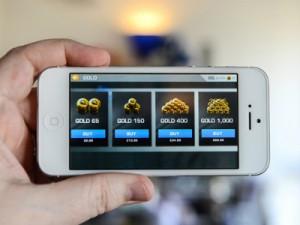A little over a year and a half ago, I received a bit of bill shock from iTunes. Imagine my surprise when I was informed that $880 been debited to my credit card over a seven day period!
Upon ringing Apple, they confirmed that my credit card had been charged numerous times for various in-app game purchases. For instance, there was one charge for $109.99 for virtual gems. Now I can assure you I probably wouldn’t spend $109.99 on real gems, let alone on virtual gems. Apple then advised that each transaction had been authorised by the input of my iTunes account password.

With this new information my suspicions were now directed to my eight year old daughter (and her iPod). Of course, when approached by me, she denied all responsibility – well at least initially. I explained to her that if she did not input the password, then fraud must have been committed on my iTunes account and I would have to report this to the police. As such, the police will want to interview her and get a signed statement that she did not commit the fraud. At this point, I may have even suggested that if she lied to a police officer, she might even be put into jail for making an incorrect statement.
At or around this point, my eight year old admitted that “she had seen Mummy input the password [on one occasion] and had then used it to purchase various in-app purchases that had popped up while she was playing free games”.
After I cleaned out my daughters entire savings bank account, grounded her and banished her to her bedroom for an inordinate amount of time, I realised that it would be very difficult to get this money back from Apple.
However, after I cooled down and a couple of weeks went by, I started googling the issue further. As such, I came across examples in the United Kingdom where a child had knocked up $1,500 worth of in-app purchases within 10 minutes. The parents had entered their password to allow the child to purchase a free game. Little did the parents know that the game subsequently prompted the child to make in-app (paid) purchases, whilst playing the game. Further, for a period of 10 minutes after someone enters a password, any further purchases do not require the password to be entered again. Hence the child just keep making in-app purchases when prompted by the game, to the tune of $1,500.
Given the media profile of this example, Apple offered to refund the monies back to the parents.
So I decided to search further and found that a class action had commenced in the United States and that Apple had just settled this out of court to the tune of $100 million in refunds to the applicants’ iTunes accounts.
Unfortunately, I could not find any similar class actions in Australia. So I thought I’d chance my luck and so I rang Apple and explain what had happened. I told them that I did not authorise the transactions, but rather my 8 year old daughter had overseen my wife putting in the password on one occasion (and we were particularly vigilant about this up until that point). As such, my 8 year old subsequently went onto to spend $880 on Virtual Gems within a kid’s game that was supposedly a free game.

To my great surprise, Apple said “No worries, sir. I’ll speak to my manager and we’ll get this refunded to you in full” and within 10 minutes the whole $880 had been refunded in full to my credit card.
In the end, I don’t know what I was more in shock at! Whether it was the initial shock of $880 debited to my credit card, my daughter’s eventual confession, or that Apple simply offered to refund the amount in full.
It would appear that the Apple call centre is aware of this issue (given the U.S. class action) and will, once prompted, refund any excess purchases by a child, whether authorised by a password or not. The moral of the story is if you suffer iTunes bill shock:
Ring Apple and explain the situation (and maybe mention the U.S. settlement) and seek a refund; and, You can now put Parental restrictions on your child’s device to prevent such events occurring in the future. For more details of this, follow this link http://support.apple.com/en-au/HT201304
If you liked this lifestyle tip, feel free to share it with your friends and family by forwarding this email, or liking and sharing via our Facebook page.



